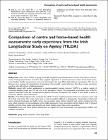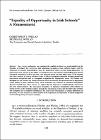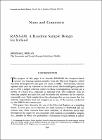Browsing by Author "Whelan, Brendan J."
Now showing items 1-9 of 9
- Sort by:
- title
- issue date
- submit date
- Order:
- ascending
- descending
- Results:
- 5
- 10
- 20
- 40
- 60
- 80
- 100
-
Building research capacity in the social sciences ? alternatives approaches
Ruane, Frances; Whelan, Brendan J. (Statistical and Social Inquiry Society of Ireland, 2011)In contrast to previous decades, the past decade has seen major investments by the Irish government in the national research capacity. As part of this investment, there has been a significant investment in the social ... -
Comparison of centre and home-based health assessments: early experience from the Irish Longitudinal Study on Ageing (TILDA).
KENNY, ROSE ANNE; O'REGAN, CLAIRE; CRONIN, HILARY; Kearney, Patricia M.; Kamiya, Yumiko; Whelan, Brendan J. (2011)Background: some cohort studies of ageing and health supplement questionnaire-based surveys with in-home measurements of biological parameters and others have required respondents to attend assessment centres. Centre-based ... -
Conservatives, liberals and pragmatists: disaggregating the results of the Irish abortion referendums of 1992
Sinnott, Richard; Walsh, Brendan M.; Whelan, Brendan J. (Economic & Social Studies, Dublin, 1995)This paper examines the results of three referendums on abortion which were held in November 1992 relating to Travel, Information and the Substantive Issue. By solving a set of simultaneous equations, it shows that the ... -
The determinants of female labour force participation: an economic analysis of survey data
Walsh, Brendan M.; Whelan, Brendan J. (Statistical and Social Inquiry Society of Ireland, 1974)This study has a double focus, substantive and methodological. Substantively, it attempts to apply and test a fairly well known model of labour supply. From a methodological point of view, it shows how the Linear Probability ... -
Equality of opportunity in Irish schools - a reassessment
Whelan, Christopher T.; Whelan, Brendan J. (Economic & Social Studies, Dublin, 1985)In a recent publication, we examined the available evidence on social mobility in the Republic of Ireland. Our contention that substantial inequalities exist conflicts sharply with the conclusion of Greaney and Kellaghan ... -
Measuring poverty in Ireland: reply
Callan, Tim; Hannan, Damian F.; Nolan, Brian; Whelan, Brendan J. (Economic & Social Studies, Dublin, 1990)MacCarthaigh makes three points with respect to the measurement of poverty, drawing on the work of Stein Ringen. We deal with these in turn, and attempt to match his comment for succinctness ? the issues are discussed in ... -
Party support in the Dail elections 1981-1992: an ecological analysis
Sinnott, Richard; Whelan, Brendan J.; McBride, James (Economic & Social Studies, Dublin, 1996)This paper is a contribution to the aggregate-level or ecological analysis of voting behaviour in Ireland. It updates and re-evaluates previous research by considering the six elections of 1981,1982 (February), 1982 ... -
Ransam - random sample design for Ireland
Whelan, Brendan J. (Economic & Social Studies, Dublin, 1979)The purpose of this paper is to describe RANSAM , the computer-based system for drawing random samples from the Electoral Register, which has been developed over the past few years at ESRI. This system, which is updated ... -
Turnout in second order elections: the case of EP elections in Dublin 1984 and 1989
Sinnott, Richard; Whelan, Brendan J. (Economic & Social Studies, Dublin, 1992)This paper argues that the distinction between first order and second order elections should be used as an analytical tool rather than as a source of different standards to be applied in assessing turnout. The Maastricht ...












